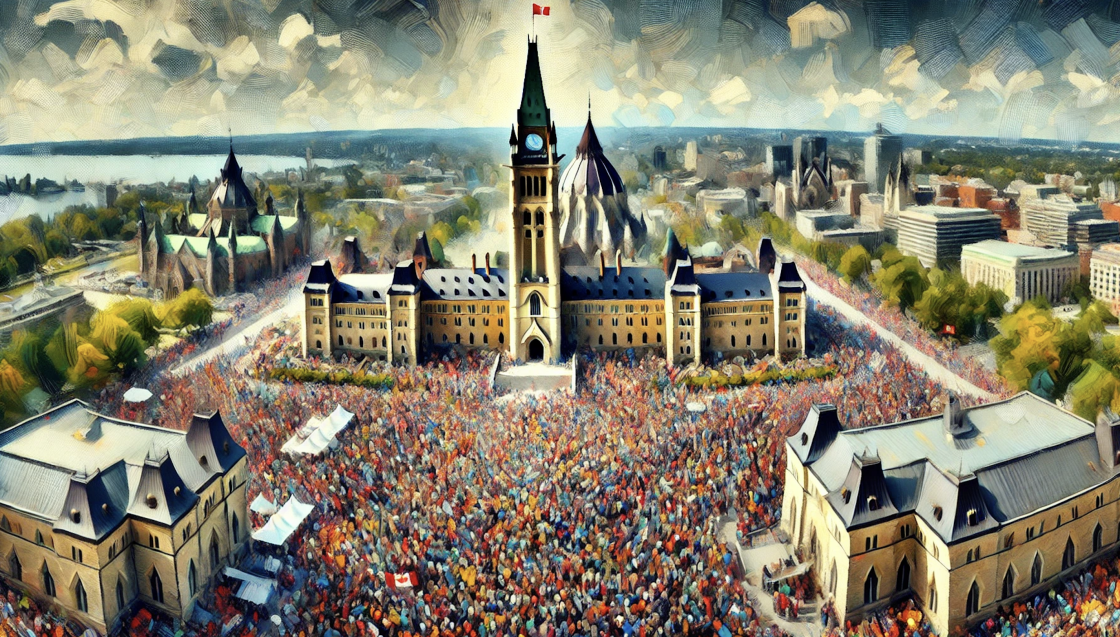In Canada, the question of who becomes the Prime Minister has always been a central part of political discussions. However, with growing disillusionment, political stagnation, and a system that seems dominated by two powerful parties, many Canadians are beginning to wonder: does it really matter who leads the country?
At a time when political scandals seem to go unpunished, the media landscape is increasingly fractured, and a significant portion of the population feels disconnected from the political process, the relevance of the Prime Minister’s office appears less clear. Record numbers of Canadians may choose to disengage entirely from the next election, further calling into question the real impact of political leadership in the country.
The Reality of Canada’s Two-Party System
Although Canada officially has a multi-party political system, the reality on the ground feels more like a two-party dominance, with the Liberals and Conservatives controlling the majority of the national agenda. For many voters, the choice between these two parties is frustratingly limited, leading to feelings of helplessness and political stagnation.
The Liberal Party, in particular, has been criticized for using political tactics to consolidate its power. Through alliances and agreements with smaller parties, they have managed to block significant opposition efforts, giving the appearance of democracy but without the genuine ability to affect change. This kind of maneuvering has left many Canadians feeling that no matter who is in office, the system is rigged to maintain the status quo.
In such an environment, the identity of the Prime Minister may seem irrelevant. If real political change is stifled by party politics and backdoor deals, does it matter who holds the highest office? For many Canadians, it feels like the answer is increasingly no.
Disconnect Between Canadians and Their Government
A key factor in this growing apathy is the widening gap between everyday Canadians and their understanding of how the government works. While most are aware of who the Prime Minister is or which party is in power, the intricate workings of policy-making and governance often remain a mystery.
This disconnect isn’t entirely the fault of the public. Civic education is minimal, and political conversations are often buried in jargon or far removed from the daily concerns of average Canadians. For many, trying to engage with the political process feels overwhelming, leading them to opt out of participation altogether.
If people don’t understand the system, they are less likely to trust it. Many Canadians feel that their voices are ignored by those in power and that government decisions are made without considering their needs or interests. Without a sense of connection or understanding, the significance of who leads the government becomes almost irrelevant.
The Decline of Neutral News Sources
One of the main channels for Canadians to engage with political discourse—news media—has been rapidly changing. Traditional, neutral news outlets are increasingly rare, replaced by more polarizing, partisan reporting that often aims to stir up emotions rather than inform.
This growing lack of reliable, unbiased news has made it harder for Canadians to engage with politics on an informed level. The fragmentation of news outlets means that people often turn to sources that reinforce their existing views rather than challenge or broaden their perspectives. Even worse, as tensions between the government and social media companies like Meta (Facebook) intensify, Canadians are being blocked from accessing or sharing news on those platforms.
For many Canadians, social media was one of the most accessible ways to stay informed. Now, without that avenue, staying engaged in political discourse requires greater effort. As a result, many are choosing to disengage entirely. If reliable information is hard to come by, the details of who becomes Prime Minister seem less relevant.
No Accountability, No Consequences
One of the most troubling aspects of modern Canadian politics is the perception that politicians, especially those in power, face no real consequences for their actions. Political scandals are frequent, but rarely do they result in meaningful accountability. From ethics violations to broken campaign promises, it seems that politicians can say or do almost anything without losing their positions or influence.
This lack of accountability has a demoralizing effect on the public. If politicians aren’t held to the same standards as ordinary citizens, it becomes harder to believe that the political system functions fairly. In this context, many Canadians have begun to question whether it even matters who leads the country. If the system allows those in power to escape repercussions, why should anyone care who occupies the office of the Prime Minister?
The Erosion of Faith in Government
All of these factors—disengagement from the political system, lack of neutral news, and the absence of consequences—have led to a widespread erosion of faith in the Canadian government. Increasingly, Canadians feel that their government is not working for them but for political elites and special interest groups. This perception has only been reinforced by the two-party system’s stranglehold on power and the perception that nothing significant ever changes.
The result is an unprecedented level of disengagement. In the upcoming federal election, we are likely to see record low voter turnout as people decide that voting will not make a difference. This is a worrying trend, as it further undermines the legitimacy of the political process.
If Canadians lose faith in the government, it doesn’t just affect voter turnout; it impacts the broader health of the country’s political culture. Apathy and disillusionment become ingrained, leading to a cycle in which fewer people participate, giving those in power even less reason to be responsive to the public’s needs.
Does It Matter Who Becomes Prime Minister?
So, does it really matter who becomes Prime Minister of Canada? In a system where political actions seem consequence-free, where neutral information is hard to come by, and where public engagement is at an all-time low, it’s easy to see why many Canadians would feel that it doesn’t matter. The role of the Prime Minister may be significant in theory, but in practice, the policies and outcomes often feel disconnected from the lives of ordinary citizens.
That being said, leadership does matter. The Prime Minister sets the tone for the country’s approach to critical issues such as healthcare, the economy, and foreign policy. Yet, for many Canadians, the problem isn’t with leadership itself—it’s with the system that surrounds it. When people feel that they have no power to influence change, the office of the Prime Minister becomes symbolic rather than impactful.
The challenge is to restore faith in the political system itself. This means pushing for more transparency, real accountability, and better access to neutral information. Without these, the question of who becomes Prime Minister will continue to feel irrelevant to a growing number of Canadians.
In the end, it should matter who leads the Canadian government. But for it to truly matter, Canadians need to believe that their voices count, that the political process is fair, and that their leaders are accountable. Until that happens, many will continue to disengage, and the cycle of disillusionment will deepen.


